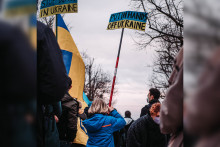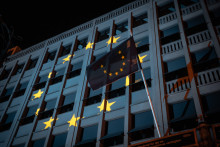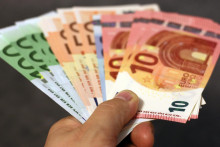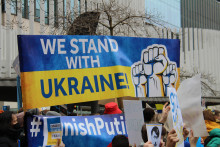It was the reality for UT researcher Dasha Dudareva (31) two years ago, in Mariupol, which was surrounded by Russians. Eventually, she manages to flee the city, together with her parents, her brother, grandmother and her dog Karma. Dudareva takes Karma to Enschede, while the rest stay with relatives in Zaporizhzhia, not far from the front line. Thanks to a special fund from the UT faculties and in particular Professor Frank Leferink, she will start working as a technician at Leferink's Power Electronics department from May 2022.
Contrast
Two years after the full-scale Russian invasion, her life is one of contrasts, she says. ‘Everything there is terrible, it’s completely destroyed. After fleeing the city, I still cherished some hope of returning. Now I cannot see any perspective.' How different is her situation in Enschede. ‘Here, it’s great. I am very happy with the opportunities and support I am getting. I have a perfect boss, a good team and was recently involved in the organisation of a TEMPEST course. I live in an apartment in the city centre, together with my dog. Because of her, I wanted to flee. I wanted to get her to safety.’
But the war is never far away for Dudareva. It imposes itself when neighbours suddenly set off fireworks. Or when colleagues talk about visiting family just before the Christmas holidays. She visited her family once, in April last year. Travelling there takes two days and being there is risky because of ongoing shelling. Other relatives stayed behind in Mariupol. Like her grandparents, who were killed in a bombing just after Dudareva fled. Her uncle found the body of her grandfather. Her grandmother’s body was taken by the Russians – she doesn't know where.
'I can feel the bad moments coming, but I can recharge in the good moments. Like a battery' - Dasha Dudareva
Bar of chocolate
In her kitchen cupboard is a bar of chocolate, pressed into her hands by a Russian soldier at one of the many checkpoints she passed during her escape. 'From a looted supermarket, of course. That's how they are, how they manipulate. Destroying your life and then reaching out.' That bar of chocolate is long past its expiration date. 'I couldn't eat it, but I cannot throw it away either.'
She has found more balance in her life. 'Although it's still going in waves. The first year I was here, I wanted to do everything at breakneck speed: work, Dutch courses... I was afraid to stop. Now I feel more balance in my life, although I still need a lot of distraction. I can feel the bad moments coming, but I can recharge in the good moments. Like a battery.'
No competition
The 24th of February marks the start of the war in Ukraine, two years ago. Meanwhile, conflicts flared up elsewhere in the world, such as in Gaza. Does she see the attention waning? 'It's shifting a bit, but I understand that. Everyone has their own experiences, problems and pain. It's not a competition. I'm getting better at dealing with my pain and emotions.'
But the deafening support she found in the Netherlands in 2022 has died down somewhat. 'I'm in a Telegram group with many other Ukrainians, but I see fewer and fewer messages appearing, fewer and fewer meetings being organised. But people are still arriving in the Netherlands and are not receiving the same support as we received in 2022. Some return to Ukraine quickly because they find it too difficult to live here.'
Gezelligheid and Zatyshok
Dudareva wants nothing more than to continue living and working in Enschede. However, her temporary contract at the UT ends after April. A conversion to a permanent position is not an option, says Dudareva. 'Because of the budget cuts, I understood. So I have to find a new job. I try not to look too far ahead and not think about that. But I don't want to sit at home. I want to do something. I know I have a lot to offer and I'm open to whatever life throws at me.'
It is perhaps the most important lesson she has learned in the past two years, she says. 'In Mariupol, I was someone who didn't take the initiative easily and was quick to say no. But I've learned to say yes to new experiences, people and opportunities. And to gezelligheid.' It is one of the three Dutch words that Dudareva learned during a her Dutch course. 'Graag, gratis and gezellig. To practice the Dutch g. Did you know that no language has a word with the same meaning as gezelligheid? Except for Ukrainian: Zatyshok.'
Political will
Over the last two years, UT researcher and EU affairs expert Shawn Donnelly has repeatedly shared his observations to U-Today on the war in Ukraine. How does he look at the situation now? Donnelly addresses two themes: political will and later in the text industrial capacity.
‘Regarding political will from European governments, I’ve seen baby steps being taken, but they are not nearly enough. Putin sees that his biggest opportunities in this regard lie in getting the United States to give up support. And looking at the transformation of the Republican party, he has been effective. The party has turned hostile against Ukraine, Europe and NATO. So Europe has to step up. When Dutch defence minister Kajsa Ollongren states that The Netherlands has to double its defence budget, I can only say that she’s completely right.’
Serhii Lysin (21), a student of Business Information Technology, prefers not to talk about two years of war, but ten. For him, the conflict with Russia began exactly ten years ago, on February 20, 2014, when the Russians annexed the Crimean peninsula. "But February 24, 2022 was also a terrible day. On the one hand, I wasn't surprised, because I had been feeling for days that something big was about to happen. But the fact that the invasion was so full-scale , that was surreal.'
Lysin appreciated the many actions that were initiated at the UT and in Enschede from day one. 'The good thing was that not only Ukrainians came to the Oude Markt, but also many Dutch people, who sympathised. That felt good, even though I was constantly worried about my family.'
Bucha
The Lysin family lives just north of Kyiv, just thirty kilometres from the suburbs of Bucha and Irpin. By now, well-known places where atrocities took place in the spring of 2022. 'That period was terrible, because my family was not far from there. The fact that I was here and they were there made the situation unbearable at times. Every day I considered going to Ukraine and leaving Enschede, but my family wanted me to stay here to do my thing.'
Before February 24, 2022, doing his thing consisted of following his studies as best he could. Since the beginning of 2023, something else has been added: Lysin runs the Lotus Foundation to raise as much money as possible for Ukrainian soldiers, healthcare workers and civilians. The foundation is named after the lotus flower, a symbol of resilience, because the Lotus grows through mud. ‘Just as resilient as the Ukrainian people.’
'They are there and I am here. As a result, it constantly feels like I'm not doing enough' - Serhii Lysin
Running the foundation acts as an outlet for Lysin, especially since he works on it full-time in some weeks. Initially, he tried to raise as much money as possible, but lately he has been trying to make a difference by using technical skills. 'Doing what I'm good at. We make tools that help volunteers in Ukraine. In total, we have already raised about 3.4 million hryvnas, about 90,000 dollars.'
5th National Guard Brigade
Almost every day, Lysin is in contact with soldiers whom he supports financially. In his bag, he carries a Ukrainian flag, with signatures of the entire 5th National Guard Brigade. The contact with the soldiers does him good, but at the same time it is difficult. 'It's very personal. I know how they've been living for two years, they're showing me videos and I know what they're going through, but I can’t feel it as I am not there with them. It's such a big part of my life, but they are there and I am here. As a result, it constantly feels like I'm not doing enough.'
Sometimes Lysin doesn't hear back from friendly soldiers for days or even weeks These are difficult times, especially if the brigade is staying in an area where there is a lot of fighting. "But that's just the situation. I'm glad I can do something. I am also grateful for the support that the Netherlands is giving to Ukraine, especially since the situation is not good at the moment. We desperately need all the help we can get.'
Last year, the student saw his mother, sister and grandparents in Poland. He has been missing his father for two years, as well as his beloved hometown of Kyiv. 'It's hard to describe what that's like. I'm in contact with Ukraine every hour of the day, collecting money, following everything, but I've never been there in the last two years. That's extremely tough, but it's the reality.’

Serhii Lysin.
Industrial capacity
UT researcher and EU affairs expert Shawn Donnelly addresses two actual war themes: previously in the text political will and here: industrial capacity.
‘In the case of industrial capacity, we need to step up drone warfare. That is the future and the Russians have adopted to that faster and more comprehensively. Right now, the Russians have shown to amount effective defences against Ukrainian counteroffensives, so this war is starting to look similar to a situation halfway World War I, with no side really gaining ground. Until the point the allies innovated to overcome the defences. That’s what we need today regarding drone warfare. We need defence companies, universities and governments to collaborate in this regard. It’s either focusing on a counteroffensive or accepting defeat. Otherwise Putin will just take one slice of Europe after another.’
On the day of the Russian invasion, Viktoriia Konashchuk (21) also visited the city centre to find support from fellow sufferers. More than a year later, she organized an exhibition at the UT, of 36 stories of Ukrainian students who never graduated. Because they were killed by Russian aggression. 'Above all, I wanted to create awareness. This was already possible among Ukrainians, but I wanted to show the consequences of the war with others. I got a lot of reactions to the exhibition. Part of being Ukrainian means constantly thinking about the war. The bad thing about that is that you get used to the war. I am no longer shocked by a missile strike that kills people. You get used to it and it's terrible.'
Konashchuk understands that less attention is paid to the war, but she doesn't like the consequences of less attention. 'I regularly speak to people who think that the war is already over, or that the situation is better than it was two years ago. If only it were true. My mother still sleeps in the bathroom regularly, because it is safer because of the double walls. She's cool about it, because you can't be worried all the time, but it's not normal.’
Flying rockets
Since February 2022, the BIT student has visited her country four times. Each time she tries to prepare herself mentally, but once in Kyiv, reality always turns out to be more unruly than images from television. ‘I panic when I see or hear rockets flying, but everyone stays calm. In fact, the population knows from the sound or shape of the rocket whether or not they should do something. It's bizarre how calm people remain at such moments.'
'We feel that there are only two options: win this war, or lose and fight to the last gasp' - Viktoriia Konashchuk
Although Konashchuk is happy that she was able to travel to Ukraine several times, the past year has been tough. Her father enlisted in the army and has been fighting at the front for a year and a half, regularly at hotspots where heavy fighting takes place. 'Recently, he fought around Avdijivka. The situation there was very unpredictable and that's difficult, for all of us. Yet we feel that there are only two options: win this war, or lose and fight to the last gasp. We don't want to make any concessions.'
In April, her father will be in Kyiv shortly for the first time since the start of the war. Viktoriia travels to the capital too, to see him again after a year and a half. 'Very special. The previous times it was nice to come back, but he wasn't there then, so it didn't feel complete.'
 Return to Ukraine
Return to Ukraine
The student (photo left) hopes to complete her bachelor's degree in the summer. After that, she wants to dedicate herself more to Ukraine. She already donates as much as she can and leads an entrepreneurial project, to help Ukrainian young people with knowledge she learns at the UT. 'But I want to start something in Ukraine where I can make a difference. I don't know if I'm experienced enough and when the right time is, because planning in a country at war is impossible. But I want to give something back to Ukraine.'
Before she does, Konashchuk is looking forward to the rendezvous with her father in April. She also hopes to see her grandparents again soon, who are staying in the southern Ukrainian city of Mykolaiv. 'The city is much less safe than Kyiv, but they don't want to leave. Grandpa was born there in 1941 at the time of the Second World War, now he is experiencing this war. Really bizarre. I hope he still gets to witness the Ukrainian victory there.'


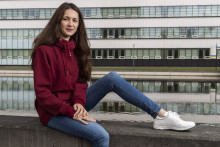
 Return to Ukraine
Return to Ukraine